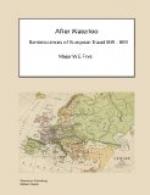I left Dresden on the 2nd March, 1819. A Landkutsche conveyed me as far as Leipzig in a day and half, stopping the first night at Oschaly, where there is a good inn. At Leipzig I put up at the Hotel de Baviere and remained five days. Leipzig is a fine old Gothic city. It is, as everybody knows, famous for its University and its Fair, which is held twice a year, in spring and in autumn, and which is the greatest mart for books perhaps in the world. The University of Leipzig and indeed all the Universities of Germany are in bad repute among the Obscuranten and eteignoirs of the day, on account of the liberal ideas professed by the teachers and scholars. In the University of Leipzig every thing may be learned by those who chuse to apply, but those who prefer remaining idle may do so, as there is less compulsion than at the English Universities. There is however such a national enthusiasm for learning, in all parts of Germany, that the most careless and ill-disposed youth would never be about to support the ridicule of his fellow students were he backward in obtaining prizes, but after all I have heard of the dissipation, lawlessness, and want of discipline at Leipzig, I can safely affirm that all these stories are grossly exaggerated: and I fancy there is little other dissipation going forward than amours with Stubenmaedchen. I do not hear of any drunkenness, gaming or horse racing; nor do the professors themselves, who ought to be the best judges of what is going on, complain of the insubordination of their pupils. But what I principally admire in this, and indeed in other German Universities, is that there are no distinctions of rank, such as gold tassels, etc., no servile attention paid to sprigs of nobility, as in the Universities in England, where the Heads of Colleges and Fellows are singularly condescending to the son of a Peer, a Minister, or a Bishop. Perfect equality prevails in Leipzig and the son of the proudest Reichsgraf is allowed no more priviledges than the son of a barber; nor do the professors make the least difference between them. In fact, in spite of the vulgar belief in England respecting the hauteur of the German noblesse and the vassalage of the other classes, I must say, from experience, that the German nobility show far less hauteur and have in general more really liberal ideas than most part of our English aristocracy, and a German burgher or shop-keeper would disdain to cringe before a nobleman as many shopkeepers, aye, and even gentry, are sometimes known to do in England. Another circumstance too proves on how much more liberal a footing Leipzig and other German Universities are than our English ones, which is, that in England none but those who profess the religion of the Church of England, or conform to its ritual, are admitted; but here all sects are tolerated and admitted, and all live in perfect harmony with each other. The students are at liberty to chuse their place of worship and the sermons that are preached in the Catholic as well as the Protestant churches are such as sensible men of whatever opinion might listen to with profit, and without being shocked by absurdities or intolerant ideas.




